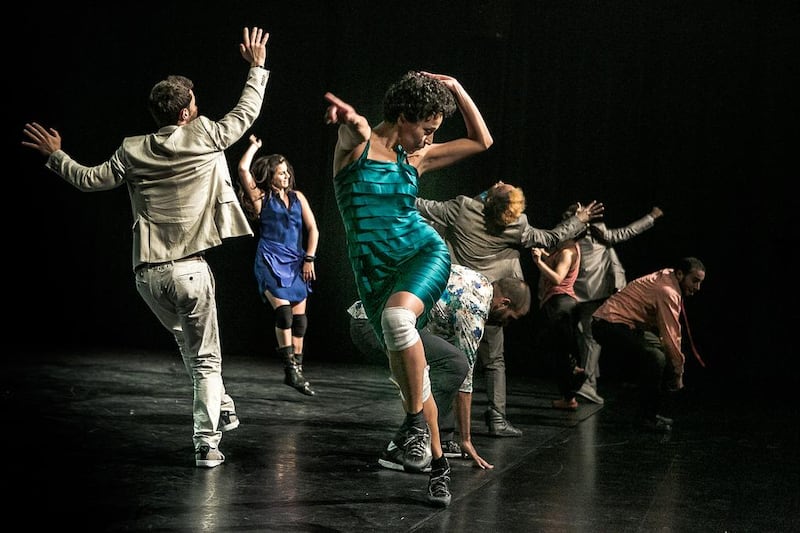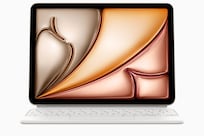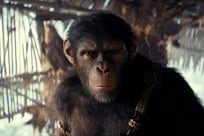Shubbak, London’s largest biennial festival of contemporary Arab arts and culture, has gone from strength to strength since its inception in 2011. With the Abu Dhabi Festival playing an important role in co-producing some of the events this year, Shubbak is far from being a UK-centric affair. In fact, when the two-week extravaganza begins on Saturday, it’s fair to say it will be a truly global celebration.
DANCE
Badke
When Hoda Al Khamis-Kanoo, artistic director of Abu Dhabi Festival, noted that ADF and Shubbak could "share the wealth of artistic expression that the Arab region has to offer ... enabling dialogue and exchange", she might well have had an eye on Badke. This collaboration between a cutting-edge Belgian dance company and 10 Palestinian performers is everything a modern festival celebrating 21st-century Arab culture should be.
As the name suggests, Badke's roots are in dabke – the Levantine folk dance – but given a twist by Belgian choreographers Koen Augustijnen, Rosalba Torres Guerrero (Les Ballets C de la B) and Hildegard De Vuyst (KVS). Working with Palestinian dancers from practices as diverse as traditional dabke, hip-hop and capoeira, they develop a joyful yet thoughtful narrative where occupation and violence are simultaneously present.
They way the characters cope with such stress is through an increasingly manic dance, driven by a vibrant soundtrack from Nasser Al Faris. The show received rave reviews in Europe – Badke has mainly toured in France, Belgium and the Netherlands – and, happily, shows in Nazareth, Jerusalem and Ramallah.
• July 14, Southbank Centre, 7.30pm
THEATRE
D-Sisyphe
Tunisian Meher Awachri's enthralling tale of a construction worker undergoing something of a life crisis has been winning plaudits – and prizes – in Europe and North America since its debut as his graduation project in 2011. So it's not surprising that its United Kingdom premiere takes place during Shubbak – hopefully further impressive notices will entice D-Sisyphe back to the UAE after its showing at the Fujairah International Monodrama Festival last year.
The subject matter would certainly strike a few chords in the UAE. Awachri plays Khmais, estranged from his family and pondering the meaning of life and faith over one long night. The show melds dramatic monologue – in Tunisian Arabic with projected English surtitles – dance and physical performance as a wooden plank takes the place of Sisyphus’s perpetually rolling stone in the Greek myth.
Emotional, engaging and often rather tender given D-Sisyphe confronts issues of religion, revolution, and how to construct a new Tunisia, this one-man show was inspired by Albert Camus's absurdist philosophical essay The Myth of Sisyphus – and is all the more compelling for it.
• July 18 and 19, Rich Mix, 35-47 Bethnal Green Road, 7.30pm
MUSIC
Burda: Asil Ensemble and Karima Skalli
Dedicated Abu Dhabi Festival-goers might remember last year’s wonderful Asil Ensemble, a Beirut-based music group dedicated to melding contemporary sounds with more traditional Arabic music. They certainly made an impression on Shubbak festival director Eckhard Thiemann – he experienced the magic of the Asil Ensemble for the first time in Abu Dhabi and immediately began planning to bring them to London this year.
In the end, Thiemann was keen to make this more than just a repeat booking, and Burda, which opens Shubbak, is a new co-presentation between the two festivals.
For the uninitiated, burdas are old Arabic song cycles consisting of poetry and music. Asil use the beautiful sounds of the 20th-century Egyptian singer/songwriter Umm Kulthum and their own Beirut-based Egyptian oud virtuoso Mustafa Said. The poems stretch from the 12th century all the way to the work of contemporary Palestinian writer Tamim Al Barghouti. But it is the addition of expressive yet grounded Moroccan singer Karima Skalli that really makes Asil Ensemble’s arrangements soar. And that sense of partnership is mirrored in the ongoing relationship between Shubbak and Abu Dhabi Festival, which aims to share and exchange programmes in the future.
“We are delighted to highlight the Arab region’s creativit this summer, and jointly celebrate Arab culture through Shubbak,” says Al Khamis-Kanoo. “In a world that is fast-paced, and challenging, this form of contemplative musical exploration is to be valued.”
• Saturday, 7pm, The Barbican, Silk Street
ART
The Nomad by Khalid Shafar
Another Abu Dhabi Festival collaboration is a fascinating art installation by the increasingly popular Dubai-based designer Khalid Shafar. Though he’s made his name with a series of furniture – his Decohaus collection of writing chairs and benches takes the elegant art deco and Bauhaus designs of the 1920s and reinterprets them for a Middle Eastern market – Shafar is working on a far grander scale at Shubbak.
The Nomad is a contemporary take on the arish, traditional Gulf houses made from palm trees and fronds. In concentrating on its skeletal structure, however, Shafar turns the piece into both an eye-catching, almost spider-like sculpture and a social space to meet and talk. And, given that The Nomad will be installed in the Rootstein Hopkins Parade Ground at Chelsea College, it will be intriguing to see how it is used.
Shafar has often employed traditional forms, bending them to shape his ideas. The dining chair he took to the Design Days Dubai festival last year had a seat made of pearls, to remind people of Dubai’s cultural heritage. His writing chairs and benches might look sharply 21st century, but they feature camel leather and Islamic octagons.
On July 20, Shafar will also take part in a discussion on traditional arish architecture with architect, author and researcher Sandra Piesik – who has literally written the book on the form. Given that Shafar has even designed and developed his own scent to reflect his Emirati identity, it’ll possibly be the best-smelling event of the festival, too.
• July 16-27, Chelsea College, 7am to 9pm; talk on July 20, Asia House, 63 New Cavendish Street, 6.45pm
Art in the public realm
Much of Shubbak’s art offerings take the artist out of the confines of the gallery and into the streets and public spaces of London. Of particular interest is a Shubbak-commissioned exclusive by French-Tunisian “calligraffiti” artist eL Seed, whose work can be seen in motorway underpasses in Qatar and walls in Jeddah. His first UK-based piece will be at Village Underground (Holywell Lane) for the duration of the festival.
Meanwhile, Breaking Cover will involve Riyadh-based Shaweesh and Talal Al Zeid and Fathima Mohiuddin creating street art in London locations, to be revealed on the Shubbak website as the work commences. The process will be filmed and screened at Rich Mix on July 25, while DJs and singers-songwriters bring the festival to a close.
Meanwhile, the most emotive public work surely comes from the Syrian-born, UK-based artist Issam Kourbaj. Another Day Lost is a series of five installations across London, which will resemble Syrian refugee camps, surrounded by a "fence" of used matches. For each day of the festival a match will be added, signifying another day since the beginning of the uprising.
OTHER HIGHLIGHTS
Film, literature and opera
One of the most interesting parts of the music strand at Shubbak is the world premiere of scenes from Cities Of Salt, the opera by Syrian composer Zaid Jabri based on Abdelrahman Munif's Gulf oil-discovery novel set in the 1930s; July 22 at Royal Opera House.
Zahed Sultan’s effortlessly cool Arab electro is at The Barbican on July 16.
The film programmes across multiple venues have been curated by Palestinian director Michel Khleifi, and explores Palestine, women and how the Arab world is represented in European cinema features films such as Description Of A Struggle by Chris Marker, The Season Of Men by Moufida Tlatli and Abdellatif Kechiche's Couscous.
There’s also a weekend of literature towards the end of the festival, with highlights including major award-winning authors such as Elias Khoury, Mourid Barghouti and Ahmed Saadawi.
And there’s plenty for families to enjoy, too. Hafla On The Square launches the festival with music and art, while the Eid Festival on Trafalgar Square on July 25 should be a great way to round off two tremendous weeks of Shubbak.
• For more information, visit www.shubbak.co.uk
artslife@thenational.ae





